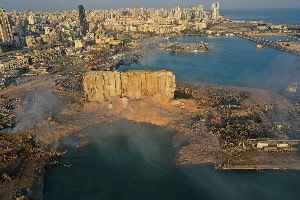[ad_1]
There has not been much to celebrate in Lebanon lately. So I was surprised to be invited to a party at Beirut’s wrecked port to wave farewell to 1,000 tonnes of toxic waste.
It’s been nine months since a stash of explosive chemicals in an ill-maintained port warehouse blew up a swath of Lebanon’s capital, killing over 200 people. With the official investigation hampered by political interference, the victims’ families still await answers as to who was responsible for the disaster. In the meantime, blame falls on a state that has been hobbled by mismanagement and corruption since the country’s civil war ended in 1990.
Standing on the quay with other guests late last month, it was a relief to watch a container of dangerous chemicals lifted on to a tanker bound for Germany, where a specialised incinerator will dispose of them. But I couldn’t help but feel sad that it had taken such destruction, and the deaths of 200 people, for Lebanese citizens to be properly safeguarded from such hazards.
The discovery of a second store of leaking, largely unidentified chemicals that had been languishing in Beirut’s port for years is a testament to what has gone wrong in the Mediterranean country — and how often it has been left to private citizens to clear up the mess.
In this case, Heiko Felderhoff, chief executive of Combi Lift, a German maritime logistics company, took the initiative. He was asked by the German government to go to Beirut in the days following the blast, and was shocked by the destruction he saw. “I think that made the decision [to take the job] a bit more human [than commercial],†says Felderhoff. He agreed to start work on removing the remainder of the dangerous chemicals that the port authority finally admitted were on the site.
He and his team spent the next seven months trying to identify the chemicals, and how best to make them safe. There was no paperwork, no explanation as to how they had got there and often no means of knowing what they were. Neither the port authority nor any of the four security services present at the port had seen fit to deal with them.

Felderhoff scrolls through videos on his smartphone showing the corroded containers and bubbling sludge his team encountered and eventually packed into 59 shipping containers. “We were the only private company to do something,†he says, gesturing at the destruction that still mars the port — twisted metal, piled car-wrecks, mountains of rubbish. He looks exasperated: “A private company is cleaning the mess.â€
Combi Lift even shouldered the initial expense of the clean-up. The Lebanese government promised to pay $2m of the $3.6m total cost, but is mired in an economic crisis and is short of dollars. Caretaker prime minister Hassan Diab told the FT in March that he had found a solution, but it wasn’t until late April that a letter of credit for $1m was issued — with the ship transporting the waste unable to leave until the money was received in Germany. The remaining $1m will be paid when the ship has arrived.
Many multilateral and international organisations had offered to help Beirut in the wake of the blast. But Felderhoff says they wouldn’t finance Combi Lift’s operation because he hadn’t followed their procurement protocols. “If the house is burning, you don’t go for tendering everywhere,†he says. He is currently in talks with the German government about funding the remaining $1.6m he is owed.
On the quay, the local allies who helped in the clean-up stood alongside Felderhoff to wave off the toxic cargo. In a short speech, Elias Assouad, president of the Lebanese German Business Council, who had helped smooth over bureaucratic obstacles, blamed the port’s destruction on “abuses by corrupt officialsâ€, prompting members of the security forces to walk off.
Nine months after the blast, the government that stood down over the devastation remains. Seemingly oblivious to the urgency of Lebanon’s crises, its squabbling politicians have failed to form a new cabinet.
“The toxic waste is going,†remarked one Lebanese party attendee. “But the source [of the problem] is still here.â€
[ad_2]
Source link






